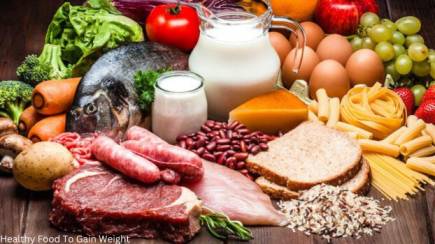Although gaining weight can be difficult when you have a rapid metabolism, it is not impossible.
Even if they want to, many people with a rapid metabolism find it difficult to gain weight.
However, if you use the appropriate method, you can gain weight and have a healthy body. In this thorough article, we’ll look at ten practical strategies for assisting weight growth with a quicker metabolism.
You can gain weight using these methods, which include food changes, exercise schedules, and lifestyle modifications.
SUMMARY
Gaining weight with a higher metabolism is not impossible, but a little bit difficult. You need to practice some exercises and follow a balanced diet to gain weight in a short time.
Table of Contents
- What are some healthy foods to gain weight?
- What Does Being Underweight Mean?
- Symptoms Of Being Underweight
- Why is weight gain so important?
- Health Risks Related to Being Underweight
- Being Underweight is Caused by Multiple Factors
- Effective strategies To Gain weight
What are some healthy foods to gain weight?
To guarantee that your weight is increasing in a way that supports general health.
It would help if you aimed for a balanced diet that includes a mixture of macronutrients and micronutrients.

It is not sufficient to only consume high-calorie foods. Some weight-gain foods are here…
- Lean proteins: salmon, tofu, chicken breast, and turkey.
- Healthy fats: avocados, seeds (such as chia and flax seeds), and nuts (like almonds, walnuts, and cashews).
- Dairy products: yogurt and cheese.
- Nut Butter: Nut butter, such as peanut butter, almond butter, and others, are high in proteins and good fats yet low in calories. Use them in smoothies or spread them over whole-grain toast.
- Eggs: Packed with healthy fats and protein, eggs are a great food source. They can be cooked, fried, or made into omelets, among other preparation methods.
- Baked or grilled foods: To maximize flavor and minimize bad fats, use baking or grilling techniques rather than frying.
- Homemade Shakes: For additional calories and nutrients, mix protein powder, fruit, nut butter, and oats with milk or milk substitutes to make your own shakes.
Adverse to this, there are several methods to lose weight that are frequently drawn into practice by people in order to lose or reduce weight frequently.
MUST READ ARTICLES: Health, Meditation, Supplements
What Does Being Underweight Mean?
Body weight below what is deemed healthy for an individual’s age, height, and gender is referred to as underweight.
Body mass index (BMI), a measurement that is often calculated using a person’s height and weight, is used to determine this.
You can use the following formula to calculate someone’s BMI and determine if they are underweight:
Height (in meters) * Height (in meters) / Weight (in kilos) equals BMI.
The general BMI ranges are as follows:
1. Beneath weight: BMI < 18.5
2. Weight Normal: BMI 18.5 to 24.9
3. Weighty: BMI between 25 and 29.9
4. Overweight: BMI of 30 or above
Someone is deemed underweight if their BMI falls below 18.5
It is crucial to remember that BMI has its limitations and does not account for things like total body composition, bone density, or muscle mass.
Symptoms Of Being Underweight

- Ribs, spine, or other bony protrusions are visible.
- Feeling weak or exhausted all the time.
- Menstrual irregularities or nonexistence (in women)
- Inadequate immune system, which causes several ailments.
- Intolerance for the cold
- Mood fluctuations and an inability to focus
Underweight people might require a customized diet, exercise regimen, and medical supervision to satisfy their unique needs and maintain their general health and well-being.
Why is weight gain so important?
Gaining weight can be significant for many distinct reasons, but it’s crucial to understand that not everyone will find it to be significant.
The importance of weight gain is contingent upon the unique circumstances and health objectives of the individual.
1. Underweight or Malnourished Individuals: Individuals who are substantially underweight or malnourished may benefit from weight gain for their health and well-being.
Underweight can cause a number of health issues, including a weakened immune system, decreased muscular mass, and dietary deficits.
In such instances, it is critical to gain weight in order to restore the body to health.
——————————————————————————————————————–
2. Illness or Surgery Recovery: Individuals may lose weight after a significant illness or surgery due to variables such as decreased appetite or higher energy expenditure during recovery.
Weight gain is necessary at this time to repair damaged tissue, regain strength, and aid in overall healing.
——————————————————————————————————————–
3. Athletic performance: Increasing muscular mass and weight can help improve performance in sports that need strength and power, such as weightlifting or American football.
Athletes frequently want to increase their muscle mass and body weight in order to improve their performance in their particular sports.
——————————————————————————————————————–
4. Bodybuilding and fitness objectives: Some people seek to acquire weight as part of their fitness or bodybuilding objectives.
They may wish to increase their muscle mass and general body weight in order to obtain a specific physique or degree of stress.



I don’t think the title of your article matches the content lol. Just kidding, mainly because I had some doubts after reading the article.
Your enticle helped me a lot, is there any more related content? Thanks!
I don’t think the title of your article matches the content lol. Just kidding, mainly because I had some doubts after reading the article.
Nice read, I just passed this onto a friend who was doing some research on that. And he just bought me lunch since I found it for him smile So let me rephrase that: Thanks for lunch! “Without friends no one would choose to live, though he had all other goods.” by Aristotle.
Your article helped me a lot, is there any more related content? Thanks!
Your article helped me a lot, is there any more related content? Thanks!
Great! Thank you so much for sharing this. Visit my websitee: free stresser
Your point of view caught my eye and was very interesting. Thanks. I have a question for you.
I don’t think the title of your article matches the content lol. Just kidding, mainly because I had some doubts after reading the article.
I have not checked in here for a while as I thought it was getting boring, but the last several posts are great quality so I guess I?¦ll add you back to my daily bloglist. You deserve it my friend 🙂
Fantastic site. Lots of helpful information here. I¦m sending it to several friends ans additionally sharing in delicious. And naturally, thank you on your effort!
Excellent post. I used to be checking continuously this blog and I am impressed! Extremely useful information particularly the final section 🙂 I handle such info much. I was looking for this particular information for a long time. Thank you and best of luck.
You got a very fantastic website, Gladiola I observed it through yahoo.
Your article helped me a lot, is there any more related content? Thanks!
Thanks for sharing. I read many of your blog posts, cool, your blog is very good.
маркетплейс аккаунтов соцсетей маркетплейс аккаунтов
безопасная сделка аккаунтов купить аккаунт
аккаунты с балансом покупка аккаунтов
маркетплейс аккаунтов соцсетей аккаунт для рекламы
биржа аккаунтов платформа для покупки аккаунтов
маркетплейс аккаунтов аккаунты с балансом
продажа аккаунтов соцсетей маркетплейс аккаунтов
Account marketplace Website for Selling Accounts
Buy accounts Account Market
Account Selling Service Account Selling Platform
Account Selling Service Account Selling Service
Find Accounts for Sale Verified Accounts for Sale
Website for Selling Accounts Social media account marketplace
Guaranteed Accounts Accounts market
Website for Selling Accounts Find Accounts for Sale
Sell Account Account Purchase
Account Catalog Account Acquisition
account catalog secure account sales
purchase ready-made accounts buy pre-made account
account exchange sell accounts
account trading secure account purchasing platform
account selling platform gaming account marketplace
account trading platform account buying service
account buying service marketplace for ready-made accounts
account exchange website for selling accounts
We stumbled over here coming from a different web address and thought I
might as well check things out. I like what I see so now i am following you.
Look forward to looking into your web page for a second time.
Feel free to visit my web page :: nordvpn coupons inspiresensation
buy accounts account selling service
account acquisition account catalog
account market https://accounts-marketplace.org
accounts for sale database of accounts for sale
account trading platform marketplace for ready-made accounts
gaming account marketplace buy account
account store secure account purchasing platform
account trading account trading platform
account buying platform find accounts for sale
account buying service website for selling accounts
sell accounts account buying platform
account trading buy pre-made account
account buying service guaranteed accounts
account selling platform account purchase
profitable account sales account buying platform
account selling platform account buying service
website for buying accounts secure account purchasing platform
Thank you for your sharing. I am worried that I lack creative ideas. It is your article that makes me full of hope. Thank you. But, I have a question, can you help me?
accounts market accounts-buy-now.org
account exchange gaming account marketplace
secure account sales purchase ready-made accounts
secure account purchasing platform https://accounts-offer.org/
accounts for sale account market
ready-made accounts for sale https://buy-best-accounts.org
Thanks for sharing. I read many of your blog posts, cool, your blog is very good.
account exchange service https://social-accounts-marketplaces.live
350fairfax nordvpn special coupon code 2025
Having read this I thought it was rather informative.
I appreciate you spending some time and energy
to put this short article together. I once again find myself personally spending
a significant amount of time both reading and posting comments.
But so what, it was still worthwhile!
online account store https://accounts-marketplace.live
account buying service buy accounts
gaming account marketplace account marketplace
buy accounts https://buy-accounts-shop.pro/
account exchange https://buy-accounts.live
accounts for sale account marketplace
accounts market https://social-accounts-marketplace.live
account selling platform https://accounts-marketplace-best.pro
магазин аккаунтов https://akkaunty-na-prodazhu.pro/
маркетплейс аккаунтов https://rynok-akkauntov.top
магазин аккаунтов kupit-akkaunt.xyz
купить аккаунт akkaunt-magazin.online
покупка аккаунтов https://akkaunty-market.live/
биржа аккаунтов https://kupit-akkaunty-market.xyz
маркетплейс аккаунтов https://akkaunty-optom.live
покупка аккаунтов https://online-akkaunty-magazin.xyz/
покупка аккаунтов akkaunty-dlya-prodazhi.pro
магазин аккаунтов https://kupit-akkaunt.online
facebook ads account for sale https://buy-adsaccounts.work/
facebook account buy buy aged facebook ads account
buy facebook ad account https://buy-ad-account.top
cheap facebook advertising account https://buy-ads-account.click
fb account for sale https://ad-account-buy.top
facebook accounts for sale https://buy-ads-account.work
facebook ads account buy ad-account-for-sale.top
buy fb ad account https://buy-ad-account.click/
buy facebook old accounts https://ad-accounts-for-sale.work/
buy verified google ads account https://buy-ads-account.top
buy google ads agency account https://buy-ads-accounts.click
Can you be more specific about the content of your article? After reading it, I still have some doubts. Hope you can help me.
buy facebook accounts cheap buy facebook accounts
old google ads account for sale https://ads-account-for-sale.top
buy google ads threshold account https://ads-account-buy.work
buy google ads invoice account https://buy-ads-invoice-account.top
buy google ad account https://buy-account-ads.work/
google ads account seller https://buy-ads-agency-account.top
buy verified google ads accounts https://sell-ads-account.click/
buy google ads threshold accounts https://ads-agency-account-buy.click
Thank you for your sharing. I am worried that I lack creative ideas. It is your article that makes me full of hope. Thank you. But, I have a question, can you help me?
verified bm https://buy-business-manager.org/
buy google ads agency account https://buy-verified-ads-account.work/
facebook bm buy buy-bm-account.org
verified business manager for sale https://buy-verified-business-manager-account.org
buy fb bm https://buy-verified-business-manager.org/
facebook bm account buy fb business manager
buy facebook bm https://business-manager-for-sale.org
facebook business manager account buy https://buy-business-manager-verified.org
buy fb bm buy verified business manager
business manager for sale buy facebook verified business account
buy verified business manager facebook https://buy-business-manager-accounts.org/
buy tiktok ad account https://buy-tiktok-ads-account.org
buy tiktok ad account https://tiktok-ads-account-buy.org
tiktok ads account for sale https://tiktok-ads-account-for-sale.org
buy tiktok ads accounts tiktok ads account for sale
buy tiktok ads accounts https://buy-tiktok-ad-account.org
buy tiktok ad account https://buy-tiktok-ads-accounts.org
tiktok ads agency account https://tiktok-ads-agency-account.org
buy tiktok ads account https://buy-tiktok-business-account.org
tiktok ads account for sale https://buy-tiktok-ads.org
Your article helped me a lot, is there any more related content? Thanks!